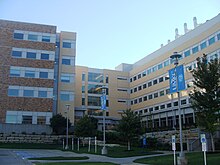|
University of Missouri–Kansas City School of Medicine
The University of Missouri–Kansas City School of Medicine, established in 1971,[9] is one of three medical schools located near downtown Kansas City and only one of two public medical schools in the state of Missouri.[10] The school offers a traditional four-year M.D. program as well as an accelerated combined B.A./M.D. program based on a six-year curriculum. The school of medicine admits students into the program directly from high school, and graduates are able to earn a baccalaureate and a Doctor of Medicine degree (B.A./M.D.) from UMKC.[11] The curriculum integrates the liberal arts, basic sciences, and clinical sciences with a team approach to learning. More than 4,000 physicians have graduated from the University of Missouri–Kansas City School of Medicine, with the majority being in the six-year combined degree program.[12] RankingsFor 2024, U.S. News & World Report ranked The University of Missouri–Kansas City School of Medicine #20 in "Most Graduates Practicing in Health Professional Shortage Areas." It tied for #75 in "Most Diverse Medical Schools."[13] CampusesThe University of Missouri–Kansas City School of Medicine operates two campuses. The Health Sciences District (HSD) campus is situated in the Hospital Hill neighborhood of Kansas City, Missouri, alongside the UMKC schools of Dentistry, Pharmacy, and Nursing. The campus is closely linked to the University Health Truman Medical Center hospital complex and Children's Mercy Hospital. The HSD campus is attended by six-year B.A./M.D. students and M.D.-Only students.[14][15]  The St. Joseph (STJ) campus is based in St. Joseph, Missouri, and currently operates within the Mosaic Life Care hospital, with a particular focus on rural health care. M.D.-Only students attend the STJ campus.[16] As of April 2024, construction is underway on a new $14.5 million St. Joseph campus. The 22,000-square-foot medical school is expected to open in June 2025.[17][18]  AdmissionsThe entering class of 2023, which includes the B.A./M.D. and M.D.-Only students, had an average GPA of 3.85 and an MCAT score of 510. There were 1,895 applicants for 136 spots. There was a 5.99 percent interview invitation rate and an overall 7.18 percent acceptance rate.[19][20] It is important to note that the B.A./M.D. students are not required to take the MCAT, while the M.D.-Only applicants are.[21][22] B.A./M.D. applicants are required to take either the ACT or the SAT. The average admitted ACT and SAT scores are 32 and 1420, respectively.[23] Additionally, for the 2023-2024 cycle, of the 1,895 applications, 18.2 percent were in-state, while 81.8 percent were out-of-state. Of the matriculants, 64.0 percent came from in-state, and 36.0 percent came from out-of-state applicants.[24] Education In addition to the six-year B.A./M.D. program, the School of Medicine offers a traditional four-year Doctor of Medicine (M.D.), Master of Science in Anesthesia, Master of Medical Science Physician Assistant, Master of Science in Bioinformatics, Master of Health Professions Education, Interdisciplinary Ph.D., and graduate certificates.[25] Six-year B.A./M.D. and M.D.-Only students gain hands-on clinical experience immediately entering their respective programs through the docent system. Each student joins a "docent team" and follows a faculty physician or docent. In this educational environment, docents offer clinical instruction while mentoring students in their personal and professional growth.[26] In addition to the docent system, medical students in both six-year B.A./M.D. (Year Two) or M.D.-Only (Year One) began the Human Structure Function series in January.[27] The Human Structure Function (HSF) series consists of integrated courses in anatomy, histology, embryology, physiology, and biochemistry of the various systems within the human body.[28] Students are projected to complete the HSF I-IV series by the end of the summer semester in B.A./M.D. Year Two or M.D.-Only Year One.[29] Pre-clinical coursework at UMKC School of Medicine, including the HSF series, is one of eleven medical schools in the United States utilizing a letter grading scale.[30] The utility of GPA has become a controversial policy in medical education. It draws criticism from students and clinical faculty due to its negative impact on student well-being during pre-clinical coursework.[31] Sojourner Health ClinicUMKC-SOM runs a student-operated outpatient clinic called the Sojourner Health Clinic on Saturdays. It caters to the under-served adult population of Greater Kansas City, offering physical exams, prescription drugs, lab work, and various social services free of charge.[32] The clinic sees more than 800 visits from underserved and uninsured patients annually. The Sojourner Health Clinic partners with Linwood United Church, Lazarus Ministries, University Health Primary Care Bess Truman Family Medicine Center, UMKC School of Medicine, UMKC Physician Assistant Program, UMKC School of Dentistry, UMKC School of Pharmacy, and Rockhurst Occupational Therapy Program.[33] Stuber Health CenterThe Stuber Health Center, formerly the Social Welfare Board Clinic, is "The oldest free and charitable clinic in the United States." It has been in operation since 1913. It provides medical, dental, and specialty services such as reproductive health to the uninsured residents of St. Joseph, Missouri, and Buchanan County. The Stuber Health Center had 4,995 primary care and 3,572 dental visits in 2023.[34] It also provides a unique opportunity for medical students from UMKC-SOM to volunteer and make an elective in their curriculum.[35] Hospital AffiliatesThe School of Medicine partners with eight hospitals within the Kansas City metropolitan area and one within the St. Joseph metropolitan area.[12][36] These include:
References
External linksWikimedia Commons has media related to University of Missouri–Kansas City School of Medicine. |
||||||||||||||||||||||||||||||||||||
